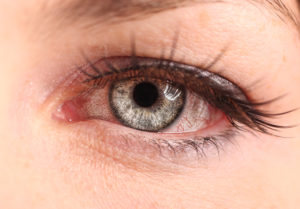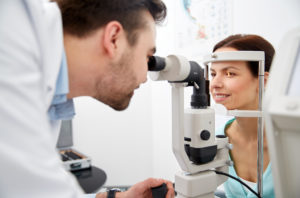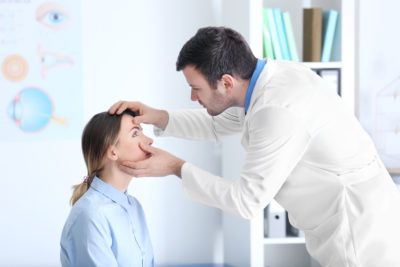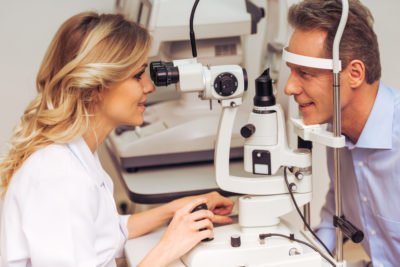Everything You Need To Know About Cataracts

By the age of 80, you have a 50 percent chance of developing cataracts. If you are unaware of how cataracts can affect your vision, it is when your lens that is normally clear becomes clouded. When you are dealing with cataracts it will cause your vision to blur, making it difficult to complete your daily activities. If you are experiencing this it is important to get it checked out right away because if left untreated cataracts can lead to blindness. Those are the basics facts about cataracts, but what are some facts you haven’t heard before? Don’t worry – we’ve got you covered. Here are 3 facts that you probably didn’t know about cataracts.
When you first start developing cataracts, they may only affect a small portion of your lens, making you unaware of the vision loss that you are incurring. As the cataract increases in size, so will your vision impairment. As the cataract continues to grow and disrupt your vision you may start to experience some of the following symptoms:
- The blurring of vision.
- Glare, or sensitivity to light.
- Double vision in one eye.
- Frequent changes in eyeglass prescription.
- Difficulty in reading in low light.
- Declining night vision.
- Fading or yellowing of colors.
As always – If you are experiencing any of the symptoms listed above, it is important to take the first step and schedule an appointment to get your eyes and vision checked out.
Currently, cataracts are very common and affect 22 million people in the United States that are above the age of 40. As you continue to age, your chances of developing cataracts continue to rise, with no known way to prevent their formation it is important to make sure that you are getting your eyes checked regularly. Worldwide, there are more cases of cataracts than there are cases of macular degeneration, glaucoma, and diabetic retinopathy combined – according to Prevent Blindness America (PBA).

We all have a couple bad habits that we can’t seem to kick – whether it is biting your fingernails or skipping flossing we are all guilty of something. But what if you found out your bad habits were affecting your eye health? We are here to help! Here are 4 bad habits that could be negatively impacting your eyes.
Constantly Being Behind A Screen
Whether it’s your cell phone, computer, or TV most people spent a lot of their time behind a screen. This can be harmful to your eyes because of the blue light that is emitted from these screens that can cause an increase in your eye strain. It is important to take breaks from looking at these screens throughout the day to ensure you are giving your eyes a rest.
Rubbing Your Eyes
Rubbing your eyes can have a negative impact on your eye health for multiple reasons. Firstly, your hands are covered in germs and bacteria and by rubbing your eyes with them you are exposing your eyes to these germs. In addition to this, you can end up damaging your cornea from the constant rubbing motion which can result in loss of vision. Your eyes will naturally use tears to wash away debris that may be in your eyes, so trust your eyes and try to keep your hands away from them as much as possible.
Sleeping In Cosmetics
If you wear makeup you have had this experience before – you are already in bed and realize you forgot to wash your makeup off. What next? Some will peel themselves out of bed to remove the day’s makeup but others will shrug it off and go to bed. When you sleep in makeup you are also sleeping in all the collected bacteria throughout the day. To protect your eyes make sure you are removing away your makeup before falling asleep at night to reduce your risk of an eye infection.
Not Wearing Sunglasses
It is important to take preventative steps to protect your vision. By wearing sunglasses outside you not only will protect your eyes from damaging UV rays but you will reduce your exposure to the wind and direct sunlight that can dry out your eyes. The longer that your unprotected eyes are exposed to UV rays the higher your chances of developing cataracts or macular degeneration later in your life are. Next time you are headed outside don’t forget to grab your sunglasses on the way out!

You have probably heard of a number of eye conditions ranging from pink eye, nearsightedness to cataracts but what do you know about macular degeneration? One important thing to know about macular degeneration is that it is currently the leading cause of vision loss in the United States. It affects the lives of over 10 million people. Do you want to know more about this eye condition? Here is everything you need to know about macular degeneration!

By the age of 80, you have a 50 percent chance of developing cataracts. If you are unaware of how cataracts can affect your vision, it is when your lens that is normally clear becomes clouded. When you are dealing with cataracts it will cause your vision to blur, making it difficult to complete your daily activities. If you are experiencing this it is important to get it checked out right away because if left untreated cataracts can lead to blindness. Those are the basics facts about cataracts, but what are some facts you haven’t heard before? Don’t worry – we’ve got you covered. Here are 3 facts that you probably didn’t know about cataracts.
When you first start developing cataracts, they may only affect a small portion of your lens, making you unaware of the vision loss that you are incurring. As the cataract increases in size, so will your vision impairment. As the cataract continues to grow and disrupt your vision you may start to experience some of the following symptoms:
- The blurring of vision.
- Glare, or sensitivity to light.
- Double vision in one eye.
- Frequent changes in eyeglass prescription.
- Difficulty in reading in low light.
- Declining night vision.
- Fading or yellowing of colors.
As always – If you are experiencing any of the symptoms listed above, it is important to take the first step and schedule an appointment to get your eyes and vision checked out.
Currently, cataracts is very common and affects 22 million people in the United States that are above the age of 40. As you continue to age, your chances of developing cataracts continue to rise, with no known way to prevent their formation it is important to make sure that you are getting your eyes check regularly. Worldwide, there are more cases of cataracts than there are cases of macular degeneration, glaucoma, and diabetic retinopathy combined – according to Prevent Blindness America (PBA).

Chances are you or someone you know has dealt with an irritating, common eye condition known as pink eye or conjunctivitis. If you have never had any first-hand experience with the side effects of pink eye, it is when your eye becomes infected and can be caused by a virus, bacteria, or an allergy. Pink eye gets its name because when you become infected your eyes become irritated and turn pink and swollen as a result.
Some other symptoms of pink eye include but are not limited to:
- Redness
- Irritation
- Redness of eyelid
- Discharge
- Gritty feeling
- Itchiness
- Puffy eyes
- Swollen lining of eyes
- Watery eyes
If you experience one or more of these symptoms it is important to schedule an appointment for a diagnosis which will allow you to get proper treatment. This is important because pink eye is a very contagious condition that can easily be passed from person to person.
You can become infected with pink eye as a result of a viral or bacterial infection as well as an allergy. The most common cause of pink eye is from a virus. People get pink eye as a result of a virus from things like the common cold, flu, respiratory infection and many others. Another way you can become infected with pink eye is from an allergic reaction, this can come from pollen, dust, contact lenses, cosmetics, and many other things. It is important to understand the signs and symptoms of this eye condition so that you can understand your treatment options and prevent spreading.

It is important to ensure that you are eating foods that are good for your overall health as well as your eye health! I’m sure you’ve heard to eat more carrots if you want strong eyes or fill your diet with leafy greens but what are you eating that could be harming your eye health? Since your eyes are vascular it is important to have a diet that is heart healthy in order to keep them on their A game! Don’t worry, we’ve got you covered – here are 3 things in your diet that are damaging your eye health!
Sweetened Drinks
The first thing in your diet that will contribute to negative eye health is sweetened drinks. These sweetened drinks are unhealthy for your eyes because they have a negative impact on your blood pressure level. The source of these sugars commonly comes from additives such as high fructose corn syrup, which raises your blood pressure. In addition to an effect on your blood pressure level, these sugary drinks also increase your triglyceride level making them a poor choice for a heart-healthy and eye-friendly diet.
Processed Foods
Consuming a diet that is high in processed foods has a negative impact on multiple aspects of your health, including your vision. These foods are full of additives that negatively impact your overall health and take a toll on your cardiovascular health. By limiting the number of processed foods, you consume you can help keep your eyes healthy and prevent many eye diseases such as macular degeneration.
Margarine
Nutritionists have stated that margarine is a source of unhealthy trans fatty acids which increases your chance of developing a cardiovascular disease. The processing and chemicals that are used to make margarine can lead to clogged arteries putting your eyes, heart, and whole body at risk.
By cutting back or cutting these 3 things out of your diet you can decrease your chances of developing an eye disease such as macular degeneration, cataracts and many more!

There are many steps you can take to keep your body healthy, including your eye health and vision. There are many factors that contribute to your eye health and these are a couple ways you can protect your vision!
Eat Healthy:
It is no secret that what we fuel our body with has an effect on every aspect of our health. To keep your eyes on their A game it is important to keep your diet rich in many things including Lutein, Zinc, Omega-3 Fatty Acids, and Vitamins C and E.
Some examples of food you can eat to fill your diet with these nutrients are:
- Fish (salmon, tuna, mackerel)
- Nuts & Seeds (walnuts, flaxseed, chia seeds)
- Whole Grains (brown rice, whole wheat pasta, quinoa)
- Leafy Greens (kale, spinach, collards)
- Citrus Fruits & Vegetables
Stay Hydrated:
It is important to keep your body not only fueled by the right food but plenty of water. Your eyes can only properly function when they have plenty of fluid that is keeping them hydrated. When you become dehydrated you can run into issues with tear production which will result in dry eyes. Drinking at least eight ounces of water every few hours is an easy way to keep hydration at the front of your mind. One way to make sure you are drinking water throughout the day is to keep a water bottle handy, filling it up whenever it may be getting low.
Wear Sunglasses:
Wearing sunglasses outside helps protect your eyes from the damaging ultraviolet (UV) rays that come from the sun. The longer that your unprotected eyes are exposed to UV rays the higher your chances of developing cataracts or macular degeneration later in your life are. When buying a new pair of sunglasses, it is important to make sure that they block out 99 to 100 percent of both UV-A and UV-B radiation.
Quit Smoking:
It is well known that smoking is the leading cause of serious health conditions that affect your lungs, heart, and much more. What most people don’t know is how smoking negatively impacts your eyes and puts you at an increased risk of developing cataracts, diabetic retinopathy, age-related macular degeneration, and dry eye syndrome. It is important to know the risks that are associated with smoking when it comes to your total health, including your eyes. By quitting smoking, you can help reduce your risks of developing one of these eye conditions!

Life gets busy and sometimes we forgot about appointments, it happens. So, if you are sitting there trying to remember when the last time you had your eyes checked – you aren’t alone. Your health is important, and it is crucial to take care of your eyes. So, when do you know it’s time to get your eyes checked?
There are several reasons why you should schedule an appointment to get your eyes examined. The first reason being the amount of time since your last appointment. Depending on your age and eye history the number of times you need to see the eye doctor will vary. Ideally, for someone under the age of 40, we suggest that you get at least one eye exam every 1-2 years if you have no previous eye complications. It is also suggested that people under the age of 50 who have eye health history such as infections, diabetes, glasses/contacts, surgery etc. to get their eyes checked at least once every year if not more frequently.
If you have any health conditions that affect your vision such as diabetes, family history, smoking, etc. it is important to attend eye exams in order to make sure that you are not at risk at any complications. By doing this you can stay on top of your eye health and make sure you are getting the proper care you need. If you are over the age of 50 and have a history of eye health problems it may be important for you to visit the eye doctor more than once a year.
Another reason why you may need to get an eye exam is if you are experiencing unusual symptoms or signs. Some of these symptoms could include:
- Itchy, Dry Eyes
- Seeing Spots, Floaters, or flashes of light
- If you are experiencing eye strain, headaches from prolonged computer/device use
- You think your prescription may have changed (blurry vision, trouble reading/seeing)
- Possible Infection
Any of these symptoms are important to be looked at to rule out any possible infections. Your eyes serve an important purpose to your overall well-being so it is vital to stay on top of your eye health and schedule an appointment today!

There are many scenarios you may find yourself in where you are at risk for an eye injury. Whether you are playing a sport, handling chemicals, or in the way of any foreign objects you could find yourself dealing with an eye injury. Don’t worry – they are common and with the right information and care they are usually manageable and easily taken care of. Here are 4 of the most common eye injuries and how you can prevent them!
Scratched Eye:
There are many things that occur that can leave you with an irritated, scratched eye. Whether its dirt particles that got into your eye, an accidental slip of a makeup brush to your eye or even a paper cut there are endless possibilities of what’s to blame for your irritated eye. To prevent scratching your eye it is important to be extremely careful when handling anything around your eye and to protect yourself from an object that can cause damage to your eyes. If you think something may have gotten in your eye it is important not to rub or dig at your eyes. Instead try blinking or washing your eye with saline solution or clean water in an effort to get out what is scratching your eye. If you have scratched your eye it is important to call your eye doctor to get it taken care of safely and quickly.
Chemical Exposure:
The next common eye injury involves substances or chemicals getting into your eyes and causing discomfort and damage. When you are surrounded by chemicals there is a chance that some of the substance could get splashed or sprayed in your eyes. It is important to protect yourself from chemicals and be cautious but if find yourself in this situation don’t panic. You should immediately rest your head under a stream of water (slightly warm) to try and wash the chemicals away from your eye. It is also very important to call your eye doctor or an urgent care center to see what they recommend as the next steps, make sure to tell them as much detail about the incident as possible including what chemical you’ve been exposed, how it entered your eye and how long ago it occurred.
Sports-Related Injuries:
When playing sports, you are putting yourself at risk on many injuries. Especially injuries related to your eyes. It is important to take steps to reduce your chances of an injury by wearing the protective gear necessary. It is estimated that 90% of sports-related eye injuries can be avoided by wearing the correct protective gear. If you do find yourself in a situation where you have injured your eyes while playing a sport it is important to call your eye doctor to get an over the phone evaluation and figure out what the next steps are to treating your injury. Each sports-related eye injury is going to vary in steps to take and seriousness that’s why it is very important to treat every eye injury as an emergency at first.
Now that you have learned more about different types of common eye injuries we hope that this will help you further protect your eyes and vision down the road. Some injuries are unavoidable and when you do find yourself in a situation like that give us a call so we can help you take the next steps towards healthy eyes!

As we get older we start thinking more and more about health and conditions we may be prone to getting. This is something you think about a lot when thinking about your eye health in particular. One condition that can start to develop as you get older is Primary Open-Angle Glaucoma. This is the most common type of glaucoma and it occurs gradually over time. When you have this condition, your eye does not drain fluid as well as it should, similar to a clogged drain. Because of this the eye pressure continuously builds up and this starts to cause damage to your optic nerve. This type of glaucoma is painless and causes no vision changes at first which is why it is commonly overlooked and not detected immediately.
Since Primary Open-Angle Glaucoma starts out with minimal to no warning signs or symptoms it is vital that you are having your eyes regularly examined. Eye exams are always important but become increasingly important as you age and could start developing these sometimes silent conditions. A regular eye exam will allow you to detect Glaucoma sooner and give you time to protect your vision. This is important to keep in mind because in the United States alone Glaucoma has left 120,000 blind.
Now that you know what Primary Open-Angle Glaucoma is and how severe it can be if it goes unrecognized it is important to take the next steps to protect yourself from this condition that could leave you blind. You can do this by scheduling an eye exam regularly to detect any warning signs of this condition as well as numerous other conditions that can negatively impact your eye health.
